- Home
- Deborah Harkness
Time's Convert Page 16
Time's Convert Read online
Page 16
“You all right, Ma?” Marcus asked, kneeling next to Patience. He rubbed her hands. “Patience. Do you hear me?”
“I’m f-fine,” his mother stammered, swaying on her feet. She removed her blood-spattered bonnet. “Your father . . .”
Marcus didn’t know whether the lump of metal had gone through his father’s skull or was still lodged within it. Either way, the man was dead.
Patience’s eyes fluttered open. She turned her head and stared into Obadiah’s unseeing eyes. Her mouth opened into a soundless O.
Marcus covered her lips before his sister screamed.
“Quiet, Patience,” Catherine said. There was a red lump under one eye. Obadiah must have struck her in his frustrated search for alcohol.
Patience nodded. Marcus removed his hand from her mouth.
“You killed Pa. What are we going to do now, Marcus?” his sister asked in a whisper.
“We could bury him,” Catherine said calmly, “out under the elm.” The tree had sheltered Marcus as he made the fatal shot.
Marcus hadn’t considered the future when he pulled the trigger and killed his father. The only thing he had been thinking of was his mother, his sister, and their safety.
“Lord save us.” Zeb stood by the corner of the house. He took in Obadiah’s body, Patience’s red-rimmed eyes and torn dress, and Catherine’s bruised face. “Go hide in the woods, Marcus. Joshua and I will come find you after dark.”
* * *
—
IT TOOK ZEB AND JOSHUA until the early hours of the morning to convince Marcus that he had to leave Hadley.
“I don’t have anywhere to go,” Marcus said numbly. The shock of the day’s events had begun to affect him. Marcus felt cold, jittery, and anxious by turns. “This is home.”
“You have to leave. You shot your father on a Sunday morning. No one hunts on the Sabbath. Someone will have heard the gun go off. And folks are going to remember seeing Obadiah in town,” Zeb said.
Zeb was right. A gunshot on their farm would not go unnoticed. And plenty of Hadley residents had walked by the place on their way to meeting. Even Tom Buckland had heard rumors that Obadiah was back.
“If you stay, you will be arrested. Your ma and Patience might even be accused of being involved,” Joshua said.
“And if I run, it will be an admission of my own guilt, and they will be free of responsibility.” Marcus put his head in his hands. The morning had dawned so bright and full of promise. He had smelled freedom on the autumn air out in Hatfield. Now he could lose not only his liberty but his life.
“Take the gun and go south, to the army. A man can lose himself in war. If you survive, you can make a new life for yourself. Somewhere else,” Joshua said. “Somewhere far away from Hadley.”
“But who will take care of Ma? And Patience?” Winters were always difficult, but with the war and the poor harvest it would be an even greater struggle to survive.
“We will,” Zeb said. “I promise you.”
Reluctantly, Marcus agreed to their plan. Joshua spread goose fat through Marcus’s hair, and followed it up with dark-colored wig powder that clung to the oily strands.
“If anybody is looking for a blond boy, they’ll look straight past you. Wait until you reach Albany before you brush it out,” Zeb said. “And nobody has seen your pockmarks. You only have a few small ones on one cheek, but even so the justices will be looking for someone smooth faced.”
Zeb had run away before, and knew a thing or two about how to hide your real identity.
“Stick to the highways for speed, then take less-traveled routes out of Albany until you reach New Jersey and Washington’s troops,” Joshua added. “That’s where the army is now. Once you’re that far south, if you haven’t read about yourself in the newspaper or been caught, I reckon you’re safe.”
“What name will you answer to?” Zeb asked.
“Name?” Marcus frowned.
“You can’t tell people you’re Marcus MacNeil,” Joshua said. “You’ll be caught for sure if you do.”
“My middle name is Galen,” Marcus said slowly. “I’ll use that. And Chauncey. Ma always said I was more Chauncey than MacNeil.”
Joshua placed his own hat on Marcus’s powdered head. “Keep your head down and your wits about you, Galen Chauncey. And don’t look back.”
13
Nine
21 MAY
Dozens of drinking vessels covered Freyja’s expansive mahogany dining room table: shot glasses inscribed with the names of bars around the world; heavy crystal wineglasses favored at the end of the nineteenth century with faceted stems that cast rainbows on the walls; a tiny jam jar from Christine Ferber; a silver julep cup; a Renaissance covered cup more than a foot tall with a horn bowl and gilt stem.
Each was filled with a mouthful of dark red liquid.
Françoise pulled aside the pale blue draperies to let in more light, revealing fine scrims of silk that filtered the sunshine. Even with that veil of protection, Phoebe blinked. The brightness was as mesmerizing as Freyja and Miriam had warned her it would be, and she was momentarily lost among the dancing dust motes.
“Here. Try this one.” Freyja, who was serving as vampire mixologist, gave a chased Tiffany cocktail shaker a final jiggle and poured the contents into a waiting silver beaker. A bottle of red wine stood nearby, the cork pulled, along with a ewer of water to dilute the blood if required. Long-handled spoons of silver, horn, and even gold littered the area by her elbow. Françoise scooped these up, deposited fresh ones, and disappeared into the nether reaches of the house.
Miriam had a clipboard and was, as usual, collating information. For Phoebe’s maker, life was a collection of data points waiting to be gathered, organized, assessed, analyzed, and regularly augmented with still more data. The development of Phoebe’s vampire taste was Miriam’s latest project.
Phoebe couldn’t help wondering whether this was how Miriam had stayed sane through the centuries without Ori. She had seen in Miriam’s blood that her maker had been prioress in Jerusalem. The priory had an extensive ossuary, and Miriam had spent much of her time there counting and recounting bones, arranging and rearranging them in new groups according to type. One year Miriam sorted them by date of burial. The next, she arranged them by size. After that, Miriam assembled whole skeletons out of the constituent parts, only to take them to pieces again and start over with another sorting scheme.
“Number thirty-two. What’s in it?” Miriam asked, scribbling a fresh entry into her notes.
“Let’s wait until Phoebe decides if she likes it or not,” Freyja said, handing Phoebe the small cup. “We don’t want her natural taste to be altered by preconceived notions of right and wrong. Phoebe must feel free to experiment and try new things.”
Phoebe had vomited up the dog’s blood after she’d been told what it was, and even though Freyja had tried to sneak some more past her, much adulterated with Châteauneuf-du-Pape and cold water, the mere thought of consuming it had nauseated her.
“I’m not hungry.” Phoebe just wanted to close her eyes and sleep. She didn’t want new foods. She was happy with Persephone’s blood.
“You have to eat.” Miriam’s tone brooked no refusal.
“I did.” Phoebe had sipped from the cat that morning.
Persephone was curled up in her basket at Phoebe’s feet, lost in slumber, the faint paddling of her paws suggesting that she was happily dreaming of chasing mice. Phoebe, on the other hand, was so mentally exhausted that she could hardly string a sentence together. A sharp pang of jealous rage that the cat could be sleeping so peacefully, when she could not, rose in her gorge with startling swiftness. She lunged.
Freyja had the cat by the scruff of the neck in a flash, while Miriam had hold of Phoebe.
“Let me go.” Phoebe’s words came out in a snarl, the reverberations in the depth
s of her throat nearly choking her.
“You do not shed blood in someone else’s house,” Miriam said, her grip tightening.
“I’ve already shed blood here,” Phoebe said, her gaze locking with Miriam’s. “Persephone—”
“The cat,” Miriam interrupted, still refusing to call it by name, “entered this house for your use and with Freyja’s permission—for consumption in your own room, not anywhere you felt like eating. It was certainly not provided for you to kill out of envy or for sport.”
For a moment, Miriam and Phoebe faced off. Then, Phoebe looked away. It was a sign of submission. This much she had learned in her four days as a vampire: Don’t challenge your elders—and certainly not your maker—with a direct stare.
“Apologize to Freyja.” Miriam dropped Phoebe and returned to her clipboard. “She’s gone to a great deal of trouble on your behalf. Most infants aren’t given this kind of consideration. They feed off what they’re given, without complaint.”
“Sorry.” Phoebe plopped back into her chair with ill grace and such force that the legs cracked ominously.
“It’s f—” Freyja began.
“It certainly is not.” Miriam’s glacial gaze returned to Phoebe. “Stand up, Phoebe. Do so without breaking anything. Once you have, go to Freyja and kneel. Then you will apologize. Properly.”
It was hard to know who was more shocked by this set of instructions—Phoebe or Freyja.
“I will not!” The whole idea of making obeisance to Freyja was appalling, even if she was Marcus’s aunt.
“It’s not necessary, Miriam,” Freyja protested, her expression alarmed. She deposited Persephone in her basket.
“I disagree,” Miriam said. “Better Phoebe learn here that incivility has consequences rather than on the streets of Paris, where the mere fact that she is to marry a de Clermont will have fledglings lining up to see if they can best her.”
“Marcus would never forgive me if his mate took to her knees before me.” Freyja shook her head.
“I’m not a great believer in modern parenting.” Miriam was quiet, but the warning in her voice was unmistakable. “Marcus knew that when he asked me to sire Phoebe. So did you. If my way of child rearing is a problem, I’ll move Phoebe to my own house.”
Freyja drew herself to her full height and lifted her chin. Phoebe didn’t have much information on Freyja’s origins, but the gesture confirmed what little she did know—that Marcus’s aunt had royal blood and had murdered her three young brothers rather than allow them to inherit the family lands.
“I promised dear Marcus I would not leave Phoebe’s side until she was reunited with him,” Freyja said coldly. “He must have had a good reason to ask for such an assurance.”
Before war could break out in the 8th arrondissement, Phoebe rose gingerly from her chair, careful not to put any pressure on the finely carved arms as she did so, and walked to Freyja as slowly as she was able to at this stage of her development. It took only two blinks, in spite of Phoebe’s best efforts to curb her speed. Gracefully, she knelt.
Actually, it started out gracefully but ended rather abruptly, her knees gouging shallow dents in the wooden floor.
Phoebe would have to work on that.
It was something about the sight of Freyja’s knees, bare and sculpted underneath the edge of her bright turquoise linen dress, freckled slightly from exposure to the sun while in the garden tending her beloved roses, that caused Phoebe to lose her senses. Like the rest of her, Freyja’s knees were perfect, elegant, and powerful. Freyja’s knees would never be forced to bend before another creature.
“I’m sorry, Freyja,” Phoebe began, sounding truly penitent. “I’m sorry that I’m being held prisoner in your house, against my will. I’m sorry Marcus didn’t tell the de Clermonts to bugger off so that we could do this our way.”
Miriam growled.
Freyja looked down at Phoebe with a mixture of astonishment and admiration.
“I’m sorry I don’t want to drink this disgusting mess of cold blood you’ve so carefully laid out for me so that we can determine whether I prefer cat to dog, rat to mouse, Caucasian females to Asian men. And I’m deeply sorry to reflect badly on my esteemed maker, to whom I owe everything,” Phoebe continued. “I am not worthy to share her blood, and yet I do.”
“That’s quite enough.” Miriam said.
But Phoebe was not finished making a mockery of her forced apology. She bolted for the table and began downing the remaining samples of blood with great speed.
“Revolting,” she proclaimed, crushing a wafer-thin glass tumbler to dust in her hands. She took up the next. “Gamey.” A silver-stemmed goblet snapped in two, the bowl separating from the base. “Putrid, like death.” She spat the liquid back into the shot glass, which was inscribed with the warning BAD DECISIONS MAKE GOOD STORIES. “Not bad, but I’d rather drink cat.” Phoebe flipped the empty wineglass over so that the bloody residue slid down the sides and made a sticky ring on the table.
On Phoebe went around the table, slurping blood and tossing glassware aside until she had consumed every last drop. In the end, only a single silver julep cup was left standing. Phoebe wiped her mouth with the back of her hand. It was trembling, and dotted with splashes of blood.
“I’d drink that.” Phoebe pointed to the small, straight-sided cup with beaded decoration around the rim (made by a Kentucky silversmith around 1850, if she was not mistaken). “But only if there was no cat around.”
“Progress, I think,” Freyja said cheerfully, surveying the carnage on her dining room table.
A gasp announced the arrival of Françoise—who would, of course, be expected to clear away the mess.
But it was Miriam’s dark expression that held Phoebe’s attention. Miriam’s face promised punishment—and not within any predictable human timeframe.
Miriam banished Phoebe, Cinderella-like, to the kitchens to assist Françoise. It took several trips up and down the stairs just to clear the debris. Phoebe was grateful for her newly enhanced cardiovascular system, not to mention her vampire speed.
Once the table was cleared, the surface wiped, the floor scrubbed by hand with a brush, and the bits of glass plucked out of Phoebe’s knees and shins, Phoebe and Françoise busied themselves at the sink. Françoise took charge of all the breakable glasses, just in case, and handed Phoebe the ones made of metal.
“Why do you stay with Freyja?” Phoebe wondered aloud.
“This is my job. All creatures need jobs. Without one, you have no self-respect.” Françoise’s reply was succinct, as usual, but it didn’t really answer Phoebe’s question.
Phoebe tried a different tack.
“Wouldn’t you rather be doing something else?” Housekeeping seemed very limited to Phoebe. She liked going to the office and keeping up with the latest developments in the art market, testing her knowledge by attributing and authenticating pieces whose value was either unknown or long forgotten.
“No.” Françoise snapped her dish towel and folded it in thirds before hanging it on the waiting rail. She turned her attention to a heaping basket of laundry and switched on the iron.
“Wouldn’t you rather work for yourself?” Phoebe was willing to entertain the possibility that there were hidden rewards to cleaning and cooking, but she couldn’t fathom a life in service to others.
“This is the life I chose. It’s a good life. I am well paid, respected, protected,” replied Françoise.
Phoebe frowned. Françoise was a vampire, and her arms were the size of small hams. She didn’t seem in need of protection.
“But you could study. Go to university. Master a subject. Do anything you liked, really.” Phoebe tried folding her own damp towel. It ended up badly, one side uneven, pulled out of shape by her efforts. She hung it on the rod next to Françoise’s.
Françoise removed it and snapped the linen open
. She folded it properly and rehung it on the rod. It was perfectly matched to the other, and both towels now gave off an air of perfect domesticity, like the pictures in the women’s magazines her mother subscribed to: soothing and mildly reproachful at the same time.
“I know enough,” Françoise replied. I know how to fold a piece of cloth properly, which is more than can be said for you, her expression said.
“Didn’t you ever want . . . more?” Phoebe asked with a bit of hesitancy. She wasn’t eager to anger another vampire who was older, faster, and stronger than she was.
“I wanted more than a life toiling in the fields of Burgundy, the soil in my hair and between my toes, until I dropped dead at the age of forty like my mother did,” Françoise replied. “I got it.”
Phoebe sat on a nearby stool, her fingers threaded together. She shifted, nervous, on her seat. Françoise had never uttered so many words at once—at least not where Phoebe could overhear her. She hoped she hadn’t offended the woman with her questions.
“I wanted warm clothes in winter, and an extra blanket at night,” Françoise continued, to Phoebe’s astonishment. “I wanted more wood for the fire. I wanted to go to sleep without hunger, and never again wonder if there would be enough food to feed the people I loved. I wanted less sickness—sickness that came each February and August to take people away.”
Phoebe recognized the cadence of her own display of temper before Freyja and Miriam. Of course Françoise had heard everything. She was subtly mimicking Phoebe—to make a point. Or to issue a warning. With vampires it was so very difficult to tell.
“So you see, I already possess all that I have ever wanted,” Françoise said in closing. “I would not be you, with your useless learning and seeming independence, for all the world.”
It was a startling announcement, for Phoebe felt her life was nearly perfect already and only going to get better with an eternity to do as she pleased and Marcus at her side.
“Why not?” Phoebe demanded.
“Because I have something you will never again possess,” Françoise said, her voice dropping to a confiding hiss, “a treasure that no amount of money can buy nor time secure.”

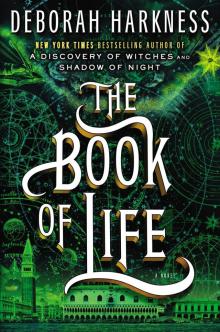 The Book of Life
The Book of Life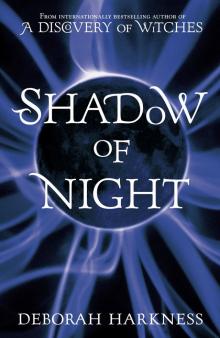 Shadow of Night
Shadow of Night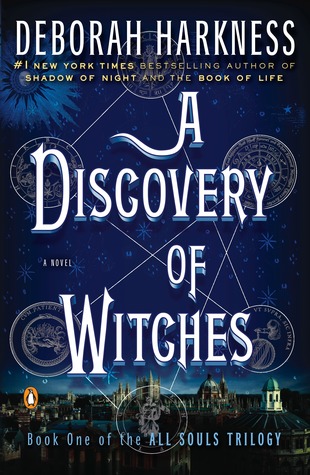 A Discovery of Witches
A Discovery of Witches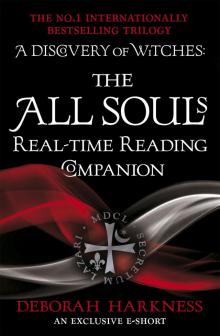 The All Souls Real-Time Reading Companion
The All Souls Real-Time Reading Companion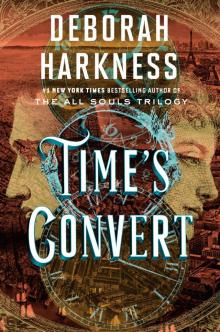 Time's Convert
Time's Convert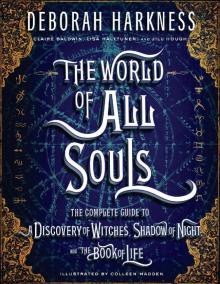 The World of All Souls
The World of All Souls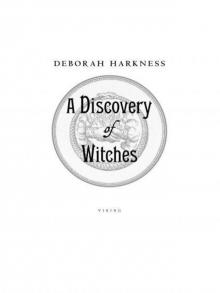 A Discovery of Witches: A Novel (All Souls Trilogy)
A Discovery of Witches: A Novel (All Souls Trilogy)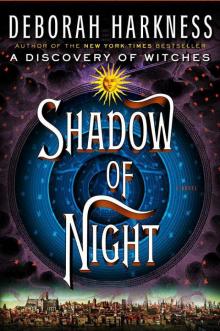 Shadow of Night: A Novel
Shadow of Night: A Novel